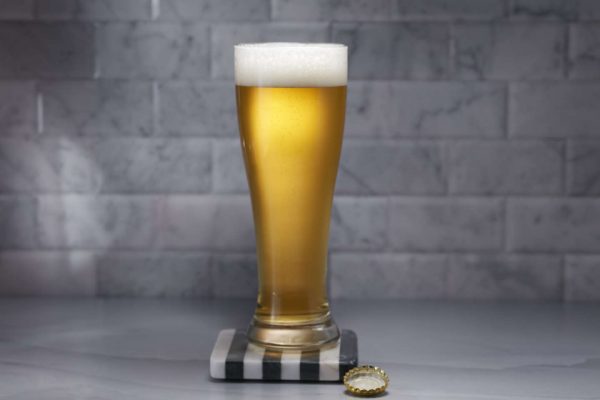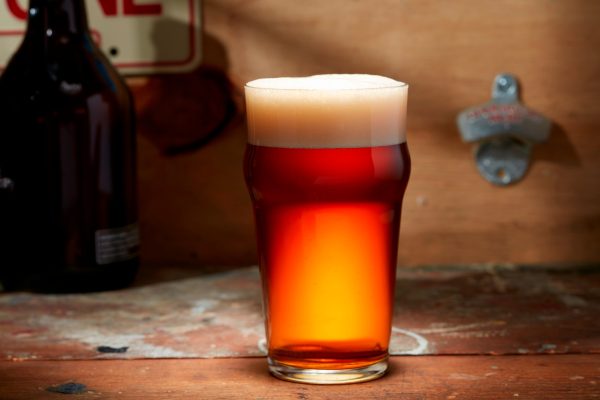

Grain d'Orge is presented by Charlie Papazian in his book Homebrewers Gold, a compilation of over 100 Gold Cup-winning all-grain and extract recipes. Commercially brewed in France by Brasserie Grain d'Ogre (formerly Brasserie Jeanne d'Arc until 2002), Grain d'Ogre earned gold in Category 34*: French-style Bière de Garde at the 1996 World Beer Cup. Charlie scaled the recipe down for homebrewing purposes and provided this character description of the gold cup-winning ale:
"...Grain d'Ogre introduces itself in a corked bottle, virtually assuring a pleasant earthy, musty aroma. Appearance is crystal-clear and light amber in color. Well carbonated with a pleasant head. First aromatic impressions are a gentle, mild maltiness and musty cork character. Subdued ale aromatics contribute to an easy complexity without fruity esters. Full-bodied with a malty finish. The assault of malt and alcohol character on the palate highlights the beer's overall impact. Noble hop bitterness is soft and mild and generally balanced towards neutrality; hop flavor does not emerge. Pale malts with a hint of Munich and Caramamunich-type malts seem apparent, but the formulation is actually aromatic Vienna and French caramel malt" (p. 240).
*Style categories have changed since 1996. Bière de Garde is now classified as Category 16D by the BJCP.
Grain d'Orge is presented by Charlie Papazian in his book Homebrewers Gold, a compilation of over 100 Gold Cup-winning all-grain and extract recipes. Commercially brewed in France by Brasserie Grain d'Ogre (formerly Brasserie Jeanne d'Arc until 2002), Grain d'Ogre earned gold in Category 34*: French-style Bière de Garde at the 1996 World Beer Cup. Charlie scaled the recipe down for homebrewing purposes and provided this character description of the gold cup-winning ale:
"...Grain d'Ogre introduces itself in a corked bottle, virtually assuring a pleasant earthy, musty aroma. Appearance is crystal-clear and light amber in color. Well carbonated with a pleasant head. First aromatic impressions are a gentle, mild maltiness and musty cork character. Subdued ale aromatics contribute to an easy complexity without fruity esters. Full-bodied with a malty finish. The assault of malt and alcohol character on the palate highlights the beer's overall impact. Noble hop bitterness is soft and mild and generally balanced towards neutrality; hop flavor does not emerge. Pale malts with a hint of Munich and Caramamunich-type malts seem apparent, but the formulation is actually aromatic Vienna and French caramel malt" (p. 240).
*Style categories have changed since 1996. Bière de Garde is now classified as Category 16D by the BJCP.
Ingredients:
- 9 lbs (4.1 kg) French 6-Row Gatinais F or Belgium Pilsener malt
- 0.5 lb (0.23 kg) French Aromatic Vienne (3.5 Lovibond) or Vienna Malt
- 0.25 lb (114 g) French Caramel malt (20 Lovibond) or Crystal malt (20 Lovibond)
- 0.25 lb (114 g) French caramel malt (30 Lovibond) or Crystal malt (30 Lovibond)
- 4.75 lbs (2.2 kg) flaked corn
- 1 lb (0.45 kg) sucrose
- 2 HBU (56 MBU) German Hallertauer pellet hops, 105 minutes (bittering)
- 2 HBU (56 MBU) French or European Brewers Gold pellet hops, 105 minutes (bittering)
- 2 HBU (56 MBU) French or European Brewers Gold pellet hops, 30 minutes (flavor)
- 1.5 HBU (43 MBU) Slovenian Styrian Goldings pellet hops, 10 minutes (aroma)
- 0.25 tsp Irish moss
- 0.75 cup corn sugar for priming in bottles. Use 1/3 cup corn sugar if priming a keg.
- Wyeast 1728 Scottish Ale yeast or other yeast producing a malty profile with low ester production and suitable for high-gravity fermentation.
Specifications:
Yield: 5 gallons (19 L)
Original Gravity: 1.087
Final Gravity: 1.026
ABV: 8%
IBU: 20
SRM: 8 (16 EBC)
Boil Time: 105 minutes
Directions:
- A step infusion mash is employed to mash the grains.
- Add 15 quarts (14 L) of 130° F (54.5° C) water to the crushed grain, stir, stabilize and hold the temperature at 122° F (50° C) for 30 minutes.
- Add 7.5 quarts (7 L) of boiling water, add heat to bring temperature up to 155° F (68° C) and hold for about 60 minutes.
- After conversion, raise temperature to 167° F (75° C), lauter and sparge with 4 gallons (15 L) of 170° F (77° C) water.
- Collect about 7 gallons (23 L) of runoff, add sucrose and bittering hops, and bring to a full and vigorous boil.
- The total boil time will be 105 minutes.
- When 30 minutes remain, add flavor hops. When 10 minutes remain, add aroma hops and Irish moss. After a total wort boil of 105 minutes (reducing the wort volume to just over 5 gallons), turn off the heat, then separate or strain out and sparge hops.
- Chill the wort to 70° F (21° C) and direct into a sanitized fermenter. Aerate the cooled wort well.
- Add an active yeast culture and ferment for 4 to 6 days in the primary. Then transfer into a secondary fermenter, chill to 60° F (15.5° C) if possible and allow to age for four weeks or more.
- When secondary aging is complete, prime with sugar, bottle or keg. Let condition at temperatures above 60° F (15.5° C) until clear and carbonated. Use corks and wire down the closure for musty-earthy “cork” character.
Partial-mash Recipe for 5 U.S. gallons (19 L):
- 4.25 lbs (1.9 kg) | English extralight dried malt extract
- 4 lbs (1.8 kg) | French 6-row Gatinais F or Belgium Pilsener malt
- 0.5 lbs (0.23 kg) | French Aromatic Vienne (3.5 Lovibond) or Vienna Malt
- 0.25 lb (114 g) | French Caramel malt (20 Lovibond) or Crystal malt (20 Lovibond)
- 0.25 lb (114 g) | French Caramel malt (30 Lovibond) or Crystal malt (30 Lovibond)
- 2.5 lbs (1.1 kg) | flaked corn
- 1 lb (0.45 kg) | sucrose
- 2.5 HBU (71 MBU) | German Hallertauer pellet hops, 90 minutes (bittering)
- 3 HBU (85 MBU) | French or European Brewers Gold pellet hops, 90 minutes (bittering)
- 2 HBU (56 MBU) | French or European Brewers Gold pellet hops, 30 minutes (flavor)
- 1.5 HBU (43 MBU) | Slovenian Styrian Goldings pellet hops, 10 minutes (aroma)
- 0.25 tsp | Irish moss
- 0.75 cup | corn sugar for priming in bottles. Use 1/3 cup corn sugar if priming a keg.
- Wyeast 1728 Scottish Ale yeast or other yeast producing a malty profile with low ester production and suitable for high-gravity fermentation.
Procedure:
A step infusion mash is employed to mash the grains. Add 7.5 quarts (7 L) of 130° F (54.5° C) water to the crushed grain, stir, stabilize and hold the temperature at 122° F (50° C) for 30 minutes. Add 4 quarts (2.9 L) of boiling water, add heat to bring temperature up to 155° F (68° C) and hold for about 60 minutes.
After conversion, raise temperature to 167° F (75° C), lauter and sparge with 2.5 gallons (9.5 L) of 170° F (77° C) water. Collect about 4.5 gallons (17 L) of runoff. Add malt extract, sucrose and bittering hops, and bring to a full and vigorous boil.
The total boil time will be 90 minutes. When 30 minutes remain, add flavor hops. When 10 minutes remain, add aroma hops and Irish moss. After a total wort boil of 90 minutes, turn off the heat, then separate or strain out and sparge hops, and direct the hot wort into a sanitized fermenter to which 2 gallons (7.6 L) of very cold water have been added. If necessary, add additional cold water to achieve a 5-gallon (19-L) batch size. Chill the wort to 70° F (21° C). Aerate the cooled wort well. Add an active yeast culture and ferment for 4 to 6 days in the primary. Then transfer into a secondary fermenter, chill to 60° F (15.5° C) if possible and allow to age for four weeks or more.
When secondary aging is complete, prime with sugar, bottle or keg. Let condition at temperatures above 60° F (15.5° C) until clear and carbonated. Use corks and wire down the closure for musty-earthy "cork" character.





Share Post